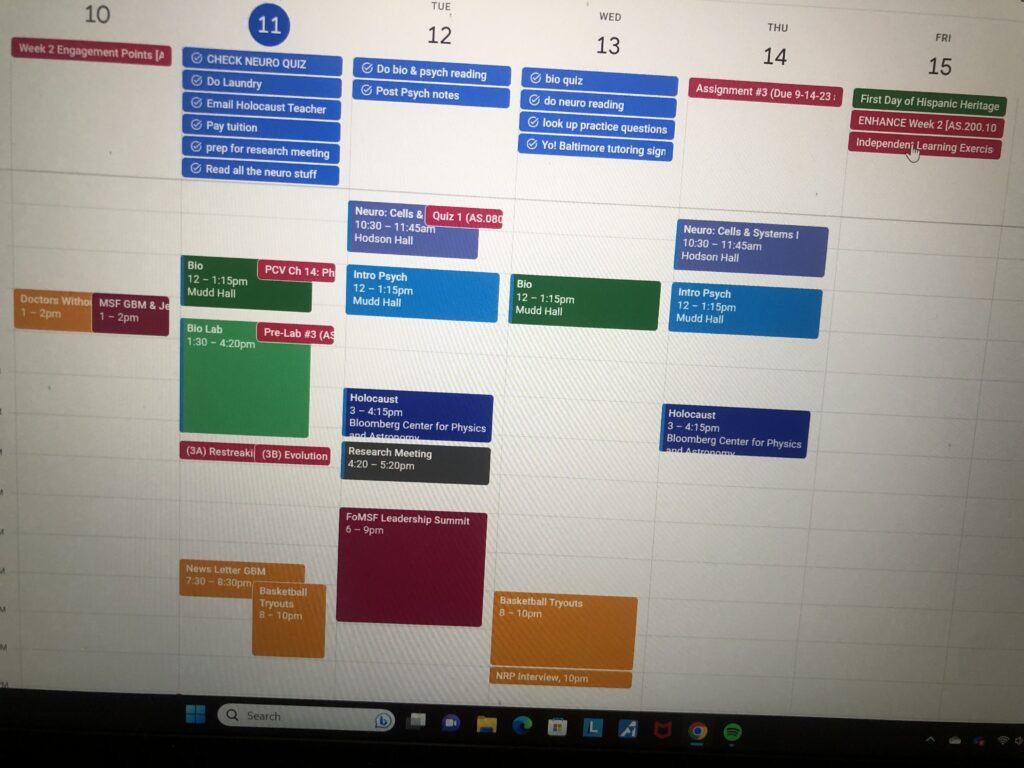
When I look back on my first year (or even the first two years) of college, I’m reminded of some lessons I learned and things I wish I’d known sooner. Although I feel like I got the hang of things quickly, there’s a few obvious (and not-so-obvious) pieces of advice I think are worth sharing. So, here’s what I like to call “Tess’ Ten Tips for First-Year Students!”
1. Walk your schedule before the first day
For anyone who’s directionally challenged like me, you should figure out where stuff is before the first day. Not only does this allow you to sleep in longer before your first class, but it can make you less nervous about the beginning of the year. Before school started, I pulled up Google Maps and found all my classes and even some bonus buildings I wasn’t looking for. I typed up my own makeshift directions on my phone and used those to navigate. Looking back, my directions are hilarious because they make no sense, but at the time, they were a lifesaver!

2. Keep a planner/calendar
Schedules tend to fill up fast, so I recommend keeping everything organized starting your first semester. Since all our classes are on Canvas (an online learning platform), I link my Canvas calendar to my Google Calendar so I can see all my classes, deadlines, and club meetings in one place. I’ve also signed up for email notifications, so I can be alerted when my exams, homework, and assignments are graded. This has made things easy to manage.

3. Communicate with professors, Teaching assistants, and advisors
Aside from studying, this is one of the best ways to understand course material and achieve the grade you’re hoping for in a class. Professors and teaching assistants (TAs) like seeing students with passion for the subject and those who are willing to work hard when they don’t initially understand something. Office hours are designed for questions, so don’t be afraid to approach professors and TAs. Academic advisors are also really good at directing you toward campus resources. Their job is to support you, so keep them in the loop when you think they can help. During my first year, I emailed my advisor with some concerns about a class. The next morning, I met with her about it, and she gave me tips about how to succeed in it. Her advice calmed my nerves and helped me get back on track with the course content. Another good rule of thumb is it can’t hurt to ask. In my smaller classes, I’ve had teachers move exams and extend deadlines simply because students said they had a lot going on that week.
4. Go to class even if you’re late
Despite your best planning, there will come a time (or many if you’re like me) that you’re late to class. Whether it’s a giant lecture hall or a teeny tiny seminar, it’s daunting to walk in after the professor has started lecturing. Don’t let this be the reason you miss class. Usually, doors are left open so you can sneak in. I’ve seen people show up during the last five minutes of class and halfway through an exam. I’ve walked in late and marched to the very front row in huge lecture rooms. If you’re ever late, just remind yourself, “At least I’m going!”
5. Follow your interests
This sounds obvious, but it’s easy to get wrapped up in things you think you “have” to do rather than “want” to do. Your major, classes, and extracurriculars should align with your interests. Doing things to check boxes will burn you out. Hopkins has so many diverse offerings that it’s easy to find research and clubs in even the most niche of areas. Taking at least one class for fun will also give you something to look forward to throughout the week. When I get busy, I also get excited because I know I like the things I’m involved in.

6. Learn from mistakes
Not only are you learning academically, but you’re also learning how to be an adult. This will come with mistakes. From a school standpoint, you might need to alter your study methods, set reminders on your phone, or reach out for help. From a life standpoint, you might need to be more assertive or improve your understanding of different perspectives and communicating your feelings. Have patience with yourself and recognize there’s a lesson to learn in every success and failure.
7. Take a break
With extracurriculars, classes, and potentially a part-time job, your schedule can feel non-stop, but the work should never be 24/7. When spring, fall, and winter break roll around, use them to recharge. If you miss your family and are able to, go home. If you need to catch up on sleep, then wake up at noon. If you want to finally get that book on gorillas that you’ve been dying to read since middle school, pick it up now! You have a lot of responsibilities in college, but the most important one is to take care of yourself. I find scheduling my breaks gives me something to look forward to, and other times I just listen to how I’m feeling in the moment. No matter how busy my schedule gets, I always make time for the things in my life that matter most to me.

8. Check the weather before you go outside
I had to add this to the list after the number of times during my first year that I walked down five flights of stairs, only to be met with a rainstorm. When you’re up high in a building, you can’t hear this at all. I couldn’t even see it looking out my window. You will forget to check, and if you’re running late like I always was, you’ll have to walk in the pouring rain to class. Get in the habit of checking the weather, or at least carry an umbrella in your backpack.

9. Plan your move-out in advance
Since a lot of students don’t have a car and live out of state, move-out day can seem like a hassle. Making a plan in advance is definitely worth it. Storage units fill up fast, and by the time May rolls around, you’ll be left picking one that’s far from campus. Start thinking about this around spring break and you’ll be good to go by the end of the school year. I mean, who wants to worry about move-out logistics when you have finals to study for and flights home to book?

10. Have confidence in yourself
Remind yourself there’s nothing to worry about and you’ve got this! Go at your own pace and don’t compare yourself to others along the way. I started slow, taking only a couple of classes and focusing solely on them. Some people jumped right into a ton of responsibilities and others fell somewhere in the middle. Everyone is different, and when you find what works for you, you’ll get the hang of things quickly.
Hopefully my tips will help you adjust to life on campus and remind you that there’s nothing to worry about when it comes to starting college. Have faith in yourself and enjoy your first year!





